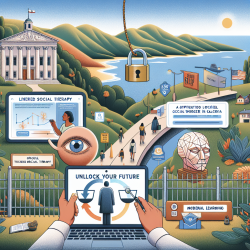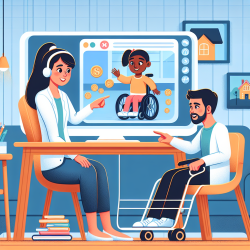You Won't Believe How This Research Could Transform Your Therapy Practice!

In the dynamic field of online therapy, practitioners continually seek innovative approaches to enhance their skills and provide superior services. One such avenue of enrichment is the integration of findings from interdisciplinary research. A notable example is the study titled "Aichi Target 18 beyond 2020: mainstreaming Traditional Biodiversity Knowledge in the conservation and sustainable use of marine and coastal ecosystems" by Fajardo et al. (2021). This research offers valuable insights that can be adapted to the realm of online therapy, particularly for special education professionals.
Understanding the Research
The study emphasizes the significance of Traditional Biodiversity Knowledge (TBK) held by Indigenous Peoples and Local Communities (IPLCs) in conserving marine and coastal ecosystems. The research identifies ten priority actions to integrate TBK into conservation practices, ensuring sustainable use and management of biodiversity. These actions include recognizing Indigenous rights, incorporating community-based targets, and enhancing the equitable participation of IPLCs in decision-making processes.
Implementing Research Outcomes in Online Therapy
Special education practitioners can draw parallels from this research to improve their therapeutic approaches. Here are some actionable strategies:
- Inclusive Practices: Just as the research advocates for the inclusion of IPLCs in biodiversity conservation, therapists can adopt inclusive practices by involving clients and their families in therapy planning and decision-making. This approach fosters a sense of ownership and empowerment.
- Community-Based Approaches: The emphasis on community-based conservation can be mirrored in therapy by leveraging community resources and support networks. Therapists can collaborate with local organizations to provide holistic support to clients.
- Recognition of Diverse Knowledge Systems: Acknowledging the value of diverse knowledge systems in conservation can inspire therapists to respect and integrate clients' cultural backgrounds and traditional knowledge into therapy. This culturally responsive approach can enhance the effectiveness of interventions.
- Capacity Building: The research highlights the need for capacity building among IPLCs. Similarly, therapists can focus on building the skills and capacities of clients and their caregivers, enabling them to manage challenges independently.
Encouraging Further Research
The research by Fajardo et al. (2021) underscores the importance of interdisciplinary approaches and the integration of traditional knowledge in modern practices. Therapists are encouraged to delve deeper into such research to discover innovative ways to enhance their practice. By staying informed and open to diverse perspectives, therapists can continually evolve and provide more effective services.To read the original research paper, please follow this link:
Aichi Target 18 beyond 2020: mainstreaming Traditional Biodiversity Knowledge in the conservation and sustainable use of marine and coastal ecosystems.
Citation: Fajardo, P., Beauchesne, D., Carbajal-López, A., Daigle, R. M., Fierro-Arcos, L. D., Goldsmit, J., Zajderman, S., Valdez-Hernández, J. I., Terán Maigua, M. Y., & Christofoletti, R. A. (2021). Aichi Target 18 beyond 2020: mainstreaming Traditional Biodiversity Knowledge in the conservation and sustainable use of marine and coastal ecosystems. PeerJ, 9, e9616. https://doi.org/10.7717/peerj.9616










